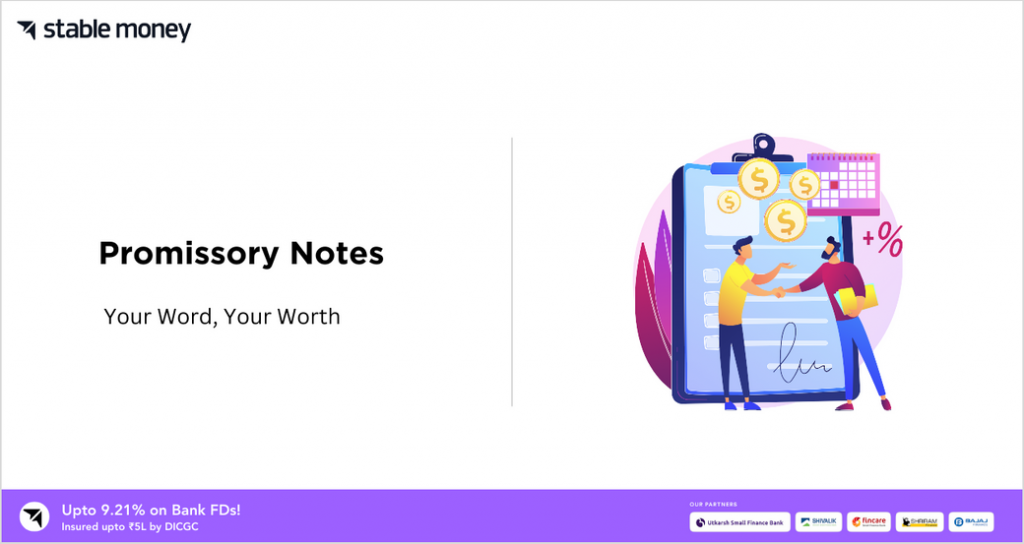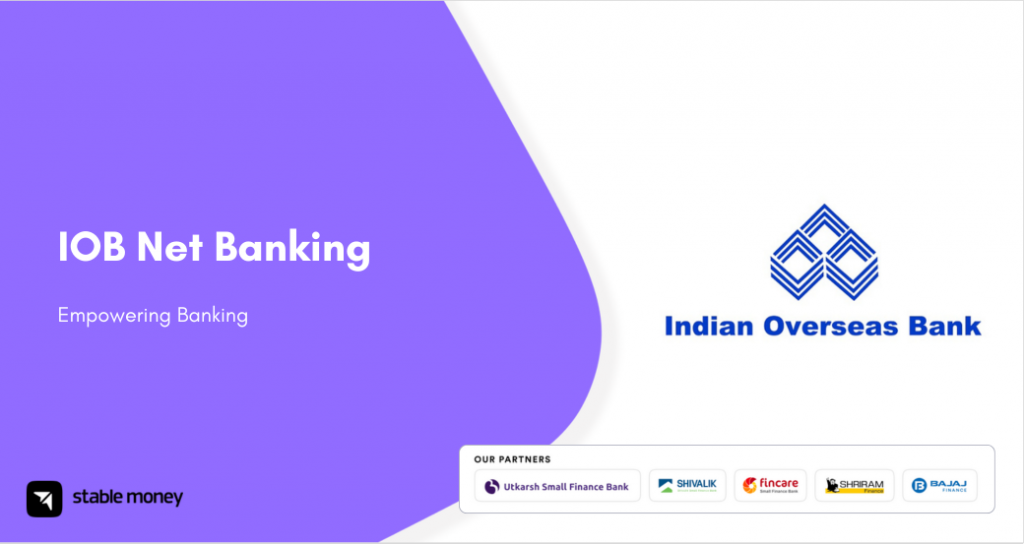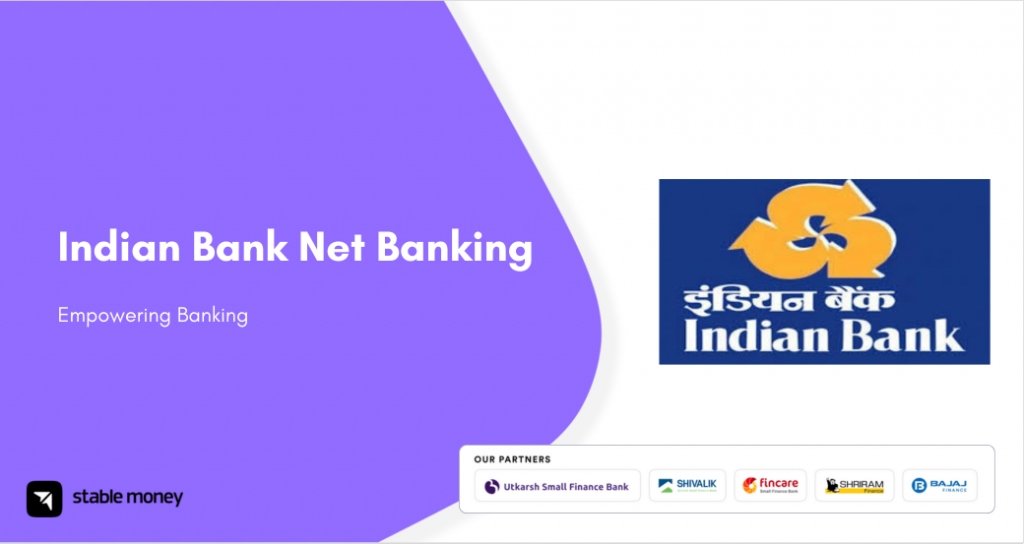
Promissory notes are simple contracts to lend or borrow money between parties. This blog explains critical aspects of promissory notes like purpose, features and importance in everyday financial transactions.
What Are Promissory Notes
A promissory note is a financial instrument one party uses to borrow money from another. It contains the basic terms of the loan, such as the amount borrowed, interest rate and repayment schedule.
Example of Promissory Notes
For example, John takes a loan of $5000 from his friend Mary to start a small business. Mary lends the amount, and John signs a promissory note acknowledging that he has received $5000 from Mary. Per their agreement, the note states that John will repay the principal and 5% interest in instalments of $500 monthly for ten months. This note can be presented as legal proof of the loan transaction between John and Mary if required in future.
How Promissory Notes Works
A promissory note is a loan agreement document between the borrower and the lender. It defines the terms of the loan being provided from one party to another. When a promissory note is signed, the borrower receives the loan amount from the lender. The borrower then has to repay this amount to the lender per the repayment schedule mentioned in the note. Promissory notes work on the basic concept of ensuring loan recovery through agreed terms written in the legal format of a note. It clarifies the obligations of both parties involved in the loan deal.
Different Types of Promissory Notes
1. Commercial Promissory Note
This type of note is used for business or commercial purposes between companies or commercial entities. It can be a note given in return for supplies, equipment, services or cash advances for meeting short-term financial obligations of business.
2. Personal Promissory Note
As the name suggests, this note is used for non-commercial personal financial transactions between individuals. It is commonly used for personal loans between family/friends with flexible terms.
How Does Promissory Notes Look Like
- Date: The date when the note is issued/signed is mentioned prominently.
- Principal Amount: The amount of borrowed money is written here in numbers.
- Interest Rate: The yearly/monthly percentage rate is specified if interest applies to the loan.
- Borrower’s Name: Full name, address and other identification details of the person/entity taking the loan.
- Lender’s Name: Same details of the person/entity providing the loan amount.
- Due Date: The exact date when the payment is due or the repayment schedule.
- Signature: Promissory note must have authentic signatures of both borrower and lender for it to be legally valid.
Steps To Write Promissory Notes
- Decide the loan amount and terms: Fix the principal amount, interest rate, if any, and repayment period, whether lump sum or EMI.
- Include personal details: Mention names, addresses and contact numbers of borrower and lender.
- Specify due date: Write the exact date by which full repayment is expected or individual instalment owing dates.
- Describe payment obligations: Clearly state whether repayment would be one total amount or divided instalments. Give instalment amounts and dates.
- Add penalty clause: State additional fee or interest to be paid for late/delayed payments beyond the due date.
- State purpose of loan: Optionally includes an objective for what loaned amount will be utilized if relevant.
- Prepare the draft: Enter all the agreed-upon terms neatly in the promissory note format.
- Obtain signatures: Get the borrower’s signature first, followed by the lender for authenticity.
What is Promissory Note Repayment
Promissory note repayment refers to returning the loan amount to the lender within the scheduled period mentioned in the note. There could be lump sum repayment where the entire principal and interest, if any, are paid on the due date. Or it can be instalment repayment through EMIs dividing the total owed into equal parts paid periodically till full settlement.
How to Invest in Promissory Notes
Investing in promissory notes involves lending money to businesses or individuals in exchange for promissory notes. Some key steps include researching various note offerings to identify viable investment opportunities. Check business finances, loan purpose and credibility of the borrower issuing the note. Negotiate loan terms like amount, interest rate, repayment period, etc, that suit your requirements. Draw legal documents incorporating all terms agreed upon. Upon accepting the promissory note post review, transfer the loan amount to the borrower.
What Are the Documents & Eligibility Criteria for Promissory Notes
1. Documents Required
- Identification proof of borrower & lender
- Address/identity proof
- Bank account details
- Income proof for repayment capacity assessment
2. Eligibility Criteria
- Individuals/Businesses needing funds & agreeing to terms.
- Aged 18+ years, having a stable source of income
- Good credit history and no defaults on existing loans
- Ability to repay the total amount within the period specified
- The purpose of the loan should be documented
- Collateral/guarantors may be required for large amounts
Parties Involved in Promissory Notes
- Borrower/Debtor: The party who signs the promissory note to obtain a loan and promises to repay it with interest.
- Lender/Creditor: The party providing the loan amount to the borrower per the promissory note terms.
- Surety/Guarantor: An additional party who assures the loan will be repaid in case the borrower defaults. I may also be a co-signer.
- Notary: Officiates authentication of signatures if required by law for enforceability.
What is the Cost Associated with Promissory Notes
The main costs involved with promissory notes are interest rates and penalties. Interest is the amount paid to the lender for borrowing capital. The rate is decided mutually but is usually higher than bank rates. Late or delayed payments attract penalty charges as specified in notes. Additional interest applies from the due date of the missed instalment or EMI.
Features & Characteristics of Promissory Notes
- A promissory note is a financial instrument where a borrower promises to pay the lender a specific amount.
- Includes repayment details like due date and interest rate.
- Serves as written proof of debt between two parties.
- Identifies borrower and lender.
- Standard terms like signatures and lawful intent.
Importance Of Promissory Notes
- Provides legally binding documents of loan/debt between two parties.
- Serves as evidence in case of any repayment-related disputes.
- Gives credibility and transparency to financial transactions.
- Make repayment terms and conditions clear to avoid any confusion.
- Acts as collateral for securing additional loans if needed.
- Convenient tool for personal/business loans between known individuals.
What If I Lost My Promissory Notes
Suppose the original promissory note is lost or destroyed. In that case, it makes it easier for the lender to prove the exact terms of the loan, such as the principal amount, interest rate, repayment timeline, etc., with a copy of the note. The lender can still claim the debt is owed, but it will require more evidence to enforce the agreed-upon terms.
What Happens If I Not Fill the Condition Mention in the Promissory Note
If the borrower does not meet any of the conditions specified in the promissory note, it results in a breach of contract. It allows the lender to pursue legal remedies for repayment, as mentioned in the note. The borrower could face penalties for missed payments or incur additional interest charges for the delay. Not adhering to the loan conditions may also negatively impact the credit score and ratings of the borrower.
What Makes the Promissory Note Enforceable
A promissory note becomes a legally binding contract between the parties when the borrower and lender sign it. It acts as evidence of indebtedness owed when it specifies critical terms, such as the repayment schedule, applicable interest rates, late fees, etc., in writing.
Is Promissory Note Guaranteed?
No, a promissory note is not a guaranteed loan or financial instrument. It is a simple document of promise where one party (borrower) agrees to pay a debt to the other (lender) as per the terms.
Is Promissory Note Same as a Vendor Note?
While both are binding contracts between two parties for fulfilling financial obligations, a vendor note is more specific. It enables a purchaser/buyer of goods or services to defer payments owed to the vendor/supplier. On the other hand, a promissory note is a more general tool that can facilitate any loan or money transfer between two individuals or entities and is not restricted to vendor-purchaser transactions alone.
What are Bank Loans?
Bank loans are sums of money lent by banks to individuals/businesses. They allow customers to borrow large amounts for various needs. Unlike personal promissory notes, bank loans offer higher credit limits but charge interest at commercial rates.
Difference Between Promissory Notes & Bank Loans
| Promissory Note | Bank Loan |
| Usually, for smaller loan amounts between individuals | It can be for much more significant loan amounts |
| Interest rate flexible | Interest rates fixed by bank |
| Simple documentation | Rigorous application process |
| Enforced personally | Strict repayment terms and penalties |
Advantages & Disadvantages of Promissory Notes
1. Advantages
- A simple and convenient way to document loans between parties
- Flexible interest rates can be negotiated
- The quick process with minimum paperwork
- Useful for personal loans between family and friends
2. Disadvantages
- Lower loan amounts as compared to bank loans
- There is a higher risk of non-payment if the borrower defaults
- No third-party guarantees in case of default
- Interest rates may be higher than bank interest rates
Final Word
In conclusion, promissory notes serve as convenient alternatives to formal loans for individuals. Understanding characteristics, processes and implications can maximize benefits and minimize risks in issuing or accepting such notes. Proper documentation remains essential.
FAQs
A promissory note is a legal document containing a written promise to pay a specific amount to another party.
An I/Owe/You note signed between friends for money borrowed is an example of a simple promissory note.
Promissory notes are legally valid and recognized form of contract in India under the Negotiable Instruments Act of 1881.
A check contains a bank’s promise to pay from available funds, but a promissory note includes only a personal promise, so they are different.
There is generally no limit for promissory note amounts as it depends on agreed terms between the borrower and the lender.
Disclaimer
This article is solely for educational purposes. Stable Money doesn't take any responsibility for the information or claims made in the blog.

